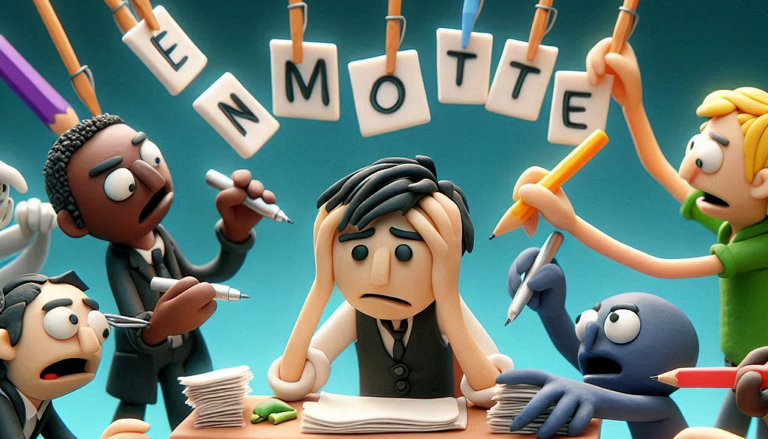One of the first aspects to consider when filling out a character profile template is the character’s name. And that is not a trivial topic. The name and its possible nickname are relevant since they provide plenty of information in just a handful of letters. A name can tell us about a time, a social context, a place, and specific circumstances. Names are those words that will be associated with the characters in our heads and make us remember them forever.
Atticus Finch, Hermione Granger, Sherlock Holmes, Frodo Bolson, Indiana Jones, Captain Nemo… All of them are great names for great characters who will occupy a place in our hearts. It is clear that the main merit lies in the fact that they are well-constructed characters, but the name also represents them, and our mouths fill when we pronounce them. Wouldn’t Sherlock Holmes be different if he were called Sherrinford Holmes, as Conan Doyle originally intended? Would we remember the protagonist of the movie The Big Lewoski the same if the Coen brothers had not nicknamed him The Dude?
🎯 Pro Tip: Good organization of characters is key to understanding if your entire cast is relevant and fulfills its function in the story. A foolproof trick for me is to organize my character cards with the Story Planner App.
Match With The Story Tone
The names of characters can give us clues about the type of story we are going to tell. An adventure movie should have different names compared to a crime thriller or a romantic comedy. For example, Indiana Jones and Hannibal Lecter are well-suited names for their respective genres. Indiana Jones is the adventurous protagonist of the “Indiana Jones” series, while Hannibal Lecter is the terrifying and ruthless psychopath from “The Silence of the Lambs.” Now, imagine if we swapped their names: the heartless killer called Indiana Jones and the intrepid archaeologist called Hannibal Lecter. The impact would be the same, wouldn’t it?
Consider The Setting And Time Period
The time and place in which a story takes place also determines the type of name we should choose for our characters. Even within the same country, some names are more common in one territory than another. Names that parents choose for their children also change a lot over time. Think about the area where you live: Do babies today have the same names as fifty years ago? Some may do, but the prevalent names have changed.
The parents’ social level and cultural stratum also influence the names and tell us a little about their family and origin. For example, in the HBO series Succession, billionaire Logan Roy’s four children are named Connor, Kendal, Siobhan, and Roman. While other characters, newcomers to the family, have much more usual names, such as Frank, Tom, or Greg. This is not a coincidence but a way of highlighting the difference between the Roys and the rest of the world.
🎓 Learn more: How to Write Character Descriptions — Guide and Examples
Reinforce Story Ideas
The characters in your novel are not islands. Your story is a whole, and the characters are part of that whole. When choosing a name or nickname, do not just think about that specific character. Also, consider if it will work within the story with the rest of your character names and what you want to convey with the set. The example from the previous point, when I was talking about the television series Succession, also serves us here: That the members of the Roy family have more unusual names than the people around them reinforces the feeling that they consider themselves different, like a kind of aristocracy above the rest of mortals.
🎯 Pro Tip: Be careful with adding similar names, such as Carla/Clara or Jane/Jean. Such similar names will require the reader to work much harder to remember who you are talking about each time, and they may constantly get confused. In fact, you may also get confused when writing the story. Unless Clara and Carla are two twin sisters who always go together and who function as a single character, avoid names that are so easily confused in your cast.
Stick To The Chosen Names… Sometimes
If you have been writing for a while, you may have already read advice that says you should choose easy-to-pronounce and remember names for your characters. Also, make them unique, but not overly complicated. As if it were that easy! But it is not necessary either. Do not underestimate the readers. If your character grabs them, if you manage to catch them with your story, they will remember the names.
What you should not do is constantly change the way you refer to a specific character. If you have read “Crime and Punishment,” you might know what I am talking about. In Russia, it is common to have several nicknames and ways of referring to the same person. In Dostoyevsky’s novel, we can find the protagonist Rodion Romanovich Raskolnikov, who also appears under the name Rodya, Rodenka, and Rodka. A real headache for any reader!
This does not mean you can not call a character different names, but as long as you do, make sure it contributes something to the story. If you change the name for no reason, you will only overwhelm the reader. The Expanse book series by James S.A. Corey has a multitude of characters. Readers need to remember the characters’ names, ships, space stations, planets, and satellites. However, some characters’ names vary depending on the circumstances: Captain James Holden, the protagonist, is known as Holden to almost everyone. But his closest friends call him Jim. And this is fine. It is logical and coherent. It would not make sense for someone so close to refer to him by his last name.
Another example from this same saga is that of the character Clarissa, whom Amos insists on calling her by the nickname Peaches. That way of calling people by their nicknames is Amos’ typical trait: A resource that works great because it tells us something about his personality and, at the same time, when we read a chapter written from the point of view of this character, the nicknames are a subtle reminder of the POV without having to influence it more explicitly.


Do Some Research
Whether your story is set in the past or present, it is helpful to research typical names for people of similar ages and social classes. This does not mean you have to use real names, but it will give you clues as to what style your character’s first name should be, and also the last name! For example, in Argentina, at the beginning of the 20th century, abandoned children in orphanages were given the surname “Exposito.” So, do your homework and research as much as your story requires.
Get Some Characters Names Ideas
To create your character names, you can use online tools, such as name dictionaries, character name generators, etc. Here are some of my favorite characters names generators:
🎯 Pro Tip: If you are writing a science fiction or fantasy story, you can use one of these tricks to create your characters’ names and nicknames:1. Turn to mythology or classical literature. They can be a source for names with powerful sounds and meanings. In The Expanse saga, the protagonist’s ship is the Rocinante, like Don Quixote’s horse. A perfect name for the feat that awaits them in the novels. In the television series Battlestar Galactica, one of the protagonists is nicknamed Apollo, the Ancient Greek the Sun and light, poetry, and more.2. Change the order of names or words. Choose strange or beautiful words and change their order or alter some letters. I find it helpful to look up medication names, which are often very particular, and mix or modify them slightly to create something new.3. Use a specific generator for fantasy or science fiction names, such as the one from Mythopedia.
Get Feedback On Your Characters Names
When parents choose names for their children, they usually take their time. It is an important decision that will last a lifetime. Rarely does a person change their name over time.
Luckily, our characters function differently. If we make mistakes when choosing their names, we can correct them in the manuscript review phase. When you send your book to beta readers to read, remember to add to the questionnaire —or whatever method you use to get feedback— a question about the characters’ names, especially those you are less sure about. Are they memorable? Do they fit well with the characters and the story? And if a name does not work, then change it.
Choosing the correct name for the characters in a novel, a script, or a story is crucial to the impact on readers. Think carefully about every name you choose, and always do it for a reason. Your story will win, and so will your readers!
